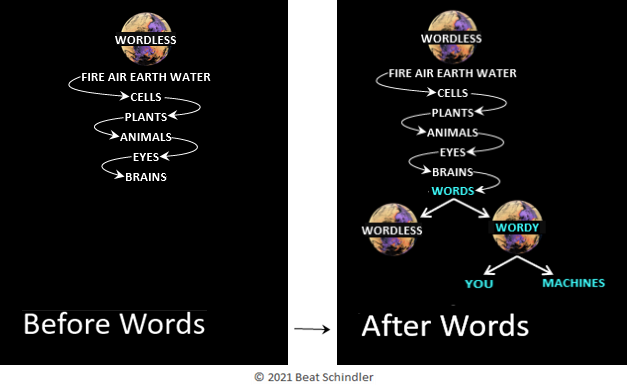Words are why we are here.
But how it happened is the secret of the wordless because when it happened, storytelling hadn’t been invented yet.
To understand what that means, we must return to when it all began.


Before Words
The wordless managed the first 99.9997% of the energy and time on Earth without us. Some of us believe that is why it took them so long – 4.65 billion years – to come up with words in the first place. Kidding aside, for the purpose and scope of this user manual, it is the birth of Earth that started the stimulus-response also known as the past or evolution:
- The elements (fire, air, wind, water)
- The cells
- The plants
- The animals
- The eyes
- The brain
When the above are read from top to bottom, they are the stimuli.
When read from the bottom up, they are the responses.
Words
Why did the wordless invent words only after they had already invented the cells, plants, animals, eyes, and brains first? What made them decide the right time for words on Earth had come approximately 13,750 years ago?
That it happened, we can bet our money on, but why is a mystery. When it happened, the only thing present was what spoke the first on Earth – presumably an animal of the homo type – and the witnesses have long gone.
- Until the invention of words, the wordless had the planet all to themselves, but now they have to share it with us.
- The appearance of words has forever divided Earth into the wordless and the wordy.
- Just as “the chicken was the egg’s idea for getting more eggs” (Marshall McLuhan), so the word-users are word’s idea for getting more words.
After Words
The last thing the word can be accused of is to have fallen asleep on the job of going forth and multiply.
On the contrary, words have multiplied from absent to billions – according to those who claim to have counted them – in just the 0.0003% of the Earth-Time they have been around.
As if by coincidence, in the same 0.0003% of Earth-Time, the word-users have also multiplied from absent to billions.
The two events, the growth in the number of words and in the number of word-users at the same time, seem to be related. What appears obvious is that words couldn’t have done it without the word-users, and the word-users couldn’t have done it without the words.

- Talk
- Write
- Press
- Telegraph
- Typewriter
- Telephone
- Radio
- TV
- Computer
- Internet
Stimulus-response rules. The above, too, when read from top to bottom, are the stimuli, and when read from the bottom up, the responses, each serving word’s idea of more words.
The internet is the most successful because it gobbles up, stores, and disseminates more words faster than all of the previous responses combined.
